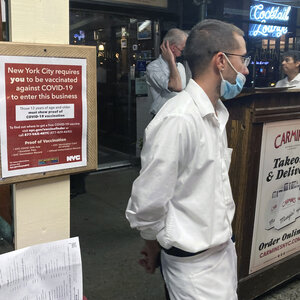A Hospital Gives Its Staff Panic Buttons After Assaults By Patients Triple
Nurses and other staff at a hospital in Missouri have experienced such a surge in assaults from patients that they will have a panic button system installed on their badges allowing them to alert hospital security more easily if they are in danger.
Between 2019 and 2020, assaults by patients tripled at the Cox Medical Center in Branson, Mo. Last year, 123 attacks against hospital staff were reported — up from 40 in 2019. Injuries related to the assaults jumped from 17 to 78 during the same period.
"That kind of raised a red flag that we need to get some extra protection in place," Brandei Clifton, the hospital's communications manager, told NPR. "Until these buttons are implemented, right now, a nurse either has to call security on her phone or scream for help, and so this is an extra easy way they can get immediate response."
During the pandemic, patients have been frustrated because they've had to wait longer to be seen and visitors have been upset they can't see their loved ones, Clifton said.
Clifton said that nurses have been "really grateful" the new system is coming. The hospital is hoping the system — which will be installed before the end of the year — will encourage more nurses to report incidents of verbal or physical violence. Many incidents currently go underreported.
"We want nurses to report everything," Clifton said, from a patient cussing them out to having a meal tray thrown at them.
The hospital said about 300 to 400 staff working in the emergency department and inpatient hospital rooms will have access to their personal panic buttons. If the button is pushed, it activates a personal tracing system, security is notified and an alert on hospital computers shows the employee's location.
Funding to implement the panic button system comes from a grant of more than $132,000 from a local charity, the Skaggs Foundation, which helps provide funding for medical projects in the region.
The panic button system was implemented last year at a nearby hospital, Cox Springfield. That hospital said the system has decreased security response time.
The pandemic has added to more workplace violence for health care workers
Since the pandemic, there's been a spike in assaults on health care workers all over the country.
The Associated Press reported that health care workers in Idaho were hesitant to be seen anywhere in public, at places such as the grocery store, in their scrubs, and have faced verbal and physical assaults.
A study published last month showed nurses who took care of patients with COVID-19 were more likely to experience verbal and physical assaults. One in 10 nurses, the study said, found it more difficult to report these incidents during the pandemic.
The workplace violence health care workers experience is an issue that's been ongoing since even before the pandemic. Data from the U.S. Bureau of Labor Statistics showed that health care workers and those who work in social assistance are five times more likely to experience workplace violence than other workers.
To be clear, those instances skew toward psychiatric and substance abuse hospitals, which saw far greater rates of injury than other hospitals and health care settings.
Faster security response time has its limits
Some experts warn that such panic buttons aren't a complete solution. They don't necessarily prevent assaults.
Some hospitals' data has also shown the racial disparities of calling hospital security.
At Seattle Children's Hospital, security was called on Black families twice as often as white families. A 2017 study from the University of Michigan also showed that hospital security was called on Black patients and visitors twice as often as other patients despite Blacks making up only 12% of the hospital population.






